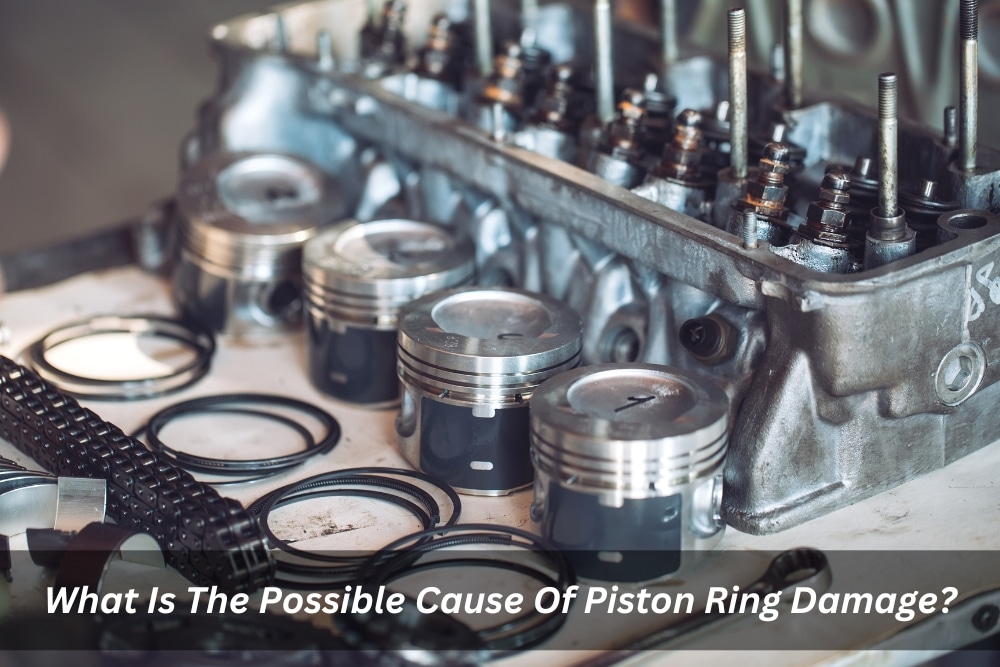Piston rings are small but crucial components within your engine, responsible for sealing the combustion chamber, maintaining compression, and ensuring proper power generation. However, like all parts of an engine, they can deteriorate over time. In this comprehensive guide, we will explore the world of piston ring damage, delving deeper into the possible causes, the symptoms to watch out for, how to diagnose and repair the issue, and essential prevention measures.
What are piston rings?
Piston rings are ring-shaped components constructed from robust materials, usually situated near the upper section of the engine’s pistons. Their chief purpose is to establish a tight seal between the piston and the cylinder wall, thereby preventing the escape of combustion gases into the crankcase and ensuring the essential compression required for effective engine performance.
Furthermore, piston rings play a vital role in reducing friction between the piston and the cylinder wall, promoting longer engine life and smoother operation. Additionally, their precise design and materials contribute to optimising fuel efficiency, making them a crucial element in the overall functionality of an internal combustion engine.
What are the symptoms of piston ring damage?
Identifying piston ring issues early is crucial, as it can prevent more extensive engine damage. Here are some common symptoms to watch out for:
- Engine knocking: A noticeable knocking sound emanating from the engine is often a sign of piston rings making contact with the cylinder walls, indicating significant wear.
- Excessive oil consumption: Since piston rings are responsible for sealing the combustion chamber and preventing oil from entering damaged rings can result in oil leakage into the combustion chamber. This oil then burns off, leading to increased oil consumption.
- Loss of power: Inefficient sealing by damaged piston rings can lead to a decrease in engine power output, negatively affecting overall performance.
- Poor fuel economy: Reduced efficiency due to piston ring damage not only results in lower power but also forces the engine to work harder, ultimately leading to poor fuel economy.
- White exhaust smoke: The combustion of oil within the combustion chamber produces white smoke, which is a clear indicator of piston ring damage.
What factors can lead to damage in piston rings?
- Overheating: Excessive engine heat is perhaps the most prevalent cause of piston ring damage. When the engine overheats, the piston rings can distort or even melt, leading to compromised sealing.
- Low oil level: Piston rings rely on a consistent supply of engine oil for lubrication. When the oil level is insufficient, the rings can experience increased friction against the cylinder walls, resulting in premature wear.
- Debris in the oil: If contaminants or debris find their way into the engine oil, they can become trapped between the piston rings and the cylinder walls, causing abrasive damage over time.
- Low compression: Reduced compression levels in the engine put additional stress on the piston rings, causing accelerated wear and diminished performance.
- Improper installation: During engine assembly or maintenance, if the piston rings are not correctly installed or positioned, they can sustain damage during the process, leading to future issues.
- Corrosion: Exposure to corrosive elements can cause the piston rings to lose their elasticity, making them more susceptible to wear and tear.
How is the diagnosis and repair of piston ring damage performed?
If you’re wondering, ‘Can you drive with bad piston rings?’ a mechanic can perform a compression test to diagnose the issue. Low compression levels are a reliable indicator of compromised rings, and the appropriate action, whether it’s repair or replacement, will depend on the severity of the damage.
Prevention of Piston Ring Damage
Preventing piston ring damage is far more cost-effective and hassle-free than addressing it after the fact. Here are some essential preventive measures:
- Regular oil changes: Timely oil changes are crucial for keeping the piston rings well-lubricated and preventing premature wear.
- Use the correct oil type: Always use the recommended engine oil type to ensure proper lubrication and prevent damage to the piston rings.
- Keep the engine clean: Regular supervision and cleaning help prevent the buildup of debris in the engine, safeguarding the piston rings from unnecessary wear.
- Proper engine tuning: The importance of regular maintenance cannot be overstated. When an engine is well-tuned, it operates at a cooler temperature and with greater efficiency, which significantly reduces the risk of piston ring damage. Therefore, routine maintenance checks and tune-ups are essential to keep your engine in optimal condition.
Conclusion
In conclusion, understanding piston ring damage, its causes, and its symptoms is essential for maintaining a healthy engine. Regular maintenance, adherence to manufacturer recommendations, and vigilance in spotting early warning signs can significantly extend the life of these critical engine components, ensuring your vehicle runs smoothly and efficiently for years to come.
Don’t allow engine issues to hinder your progress. At our Hyundai iLoad Engine Specialists, we provide assistance in keeping your vehicle operating at its peak performance. Contact us today for top-notch repairs and maintenance, and experience worry-free driving like never before. Your journey starts here, and we’re dedicated to ensuring your Hyundai iLoad engine performs at peak efficiency, delivering the reliability and power you need on the road. Therefore, don’t delay; schedule your appointment now to benefit from the expert assistance we provide.


